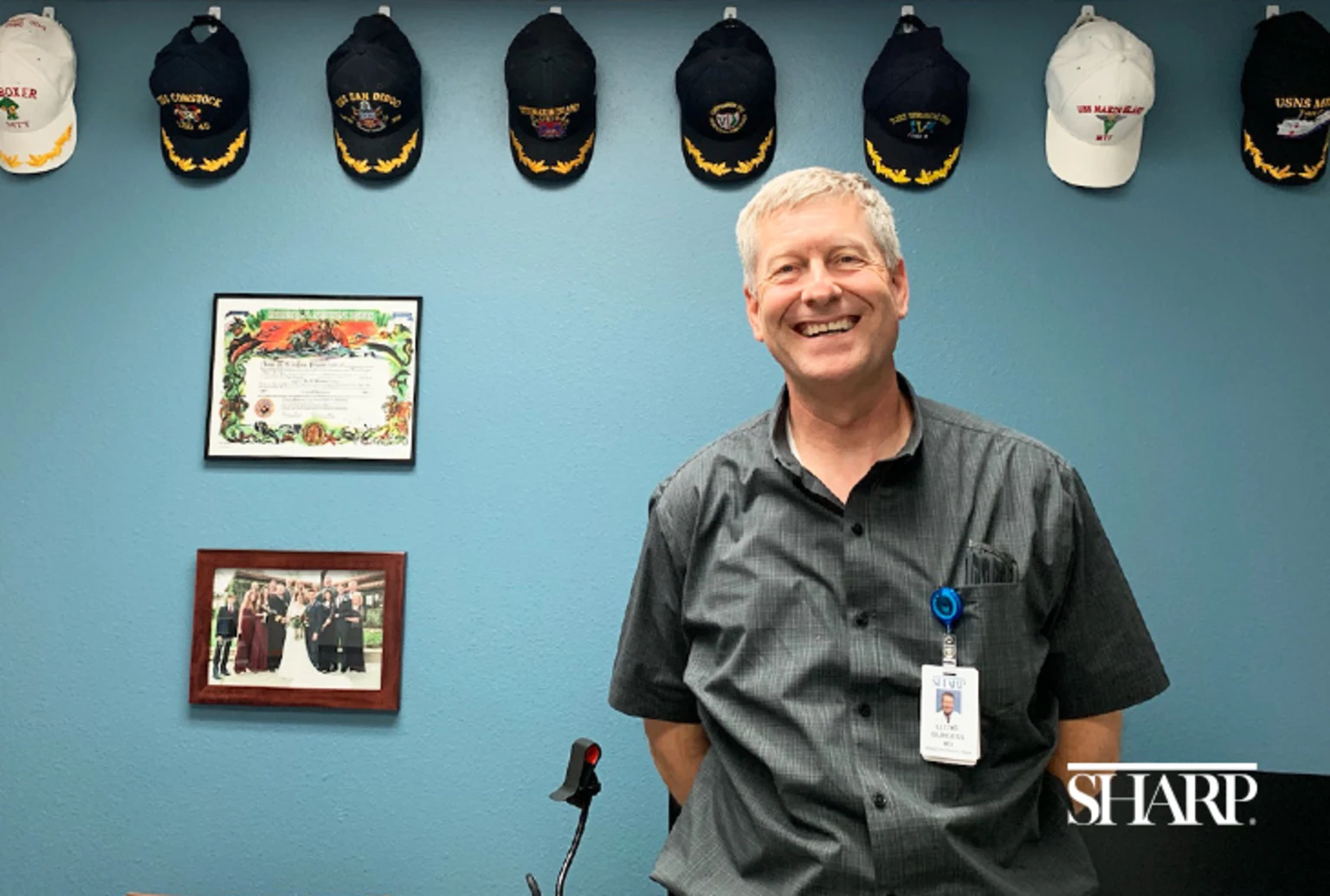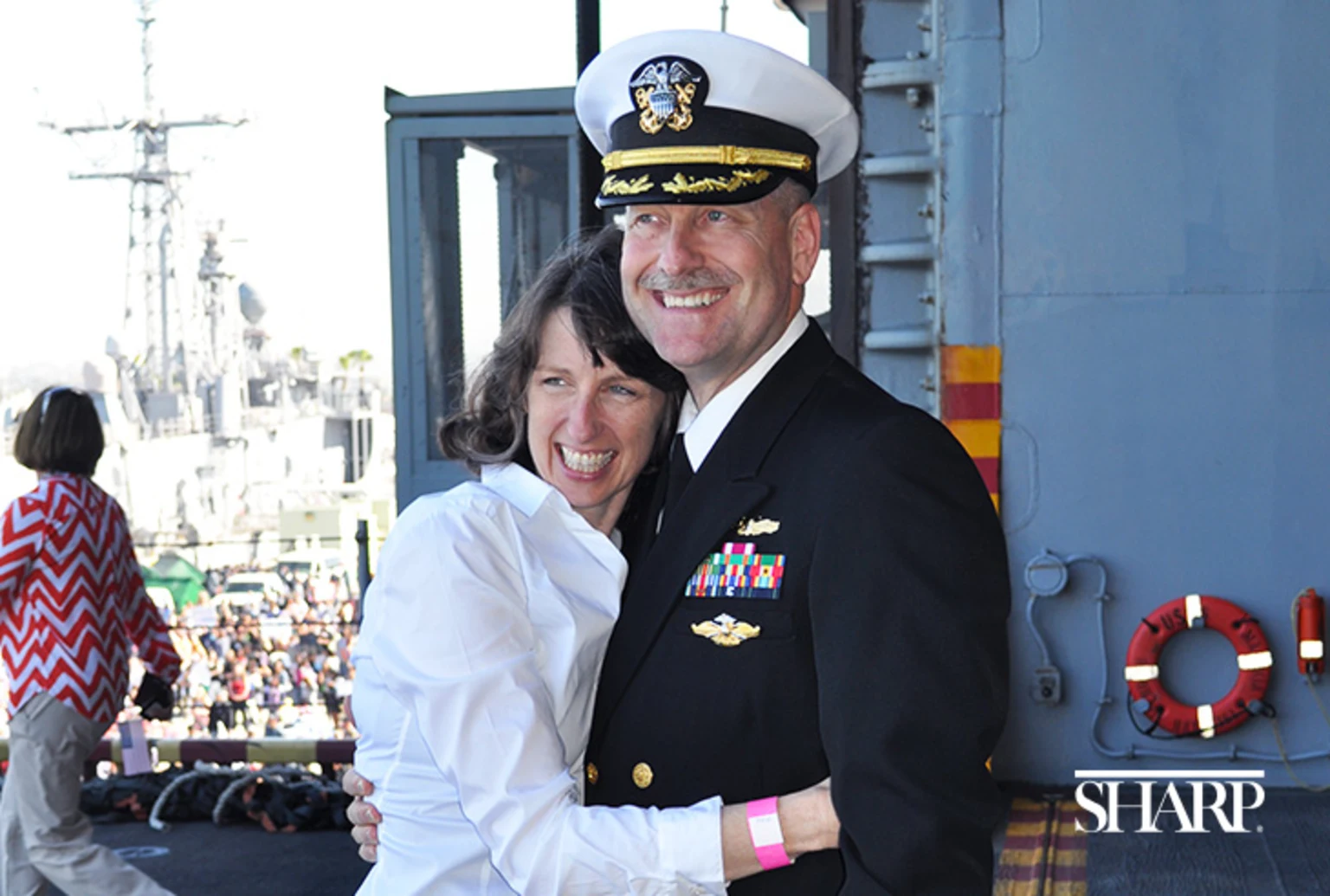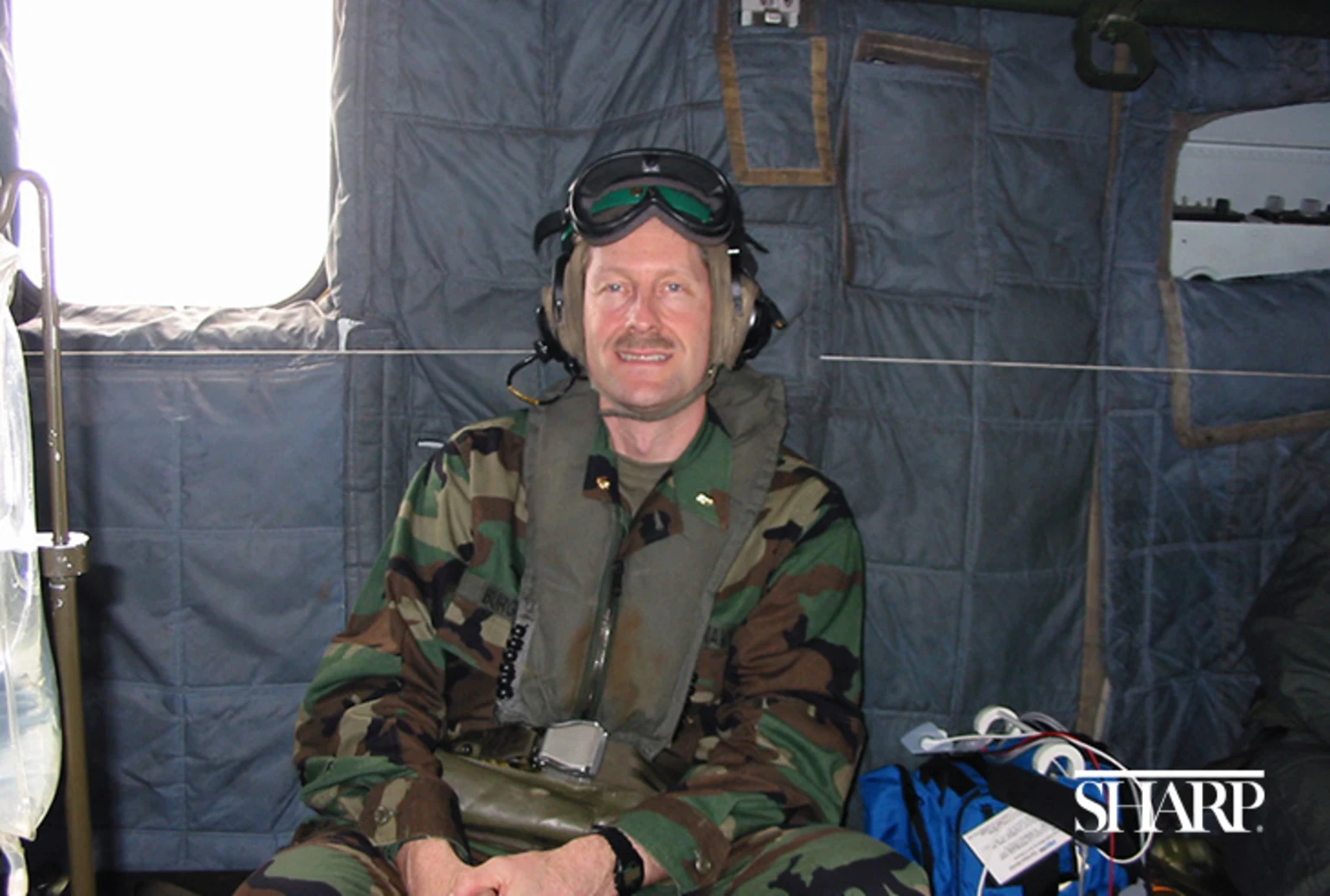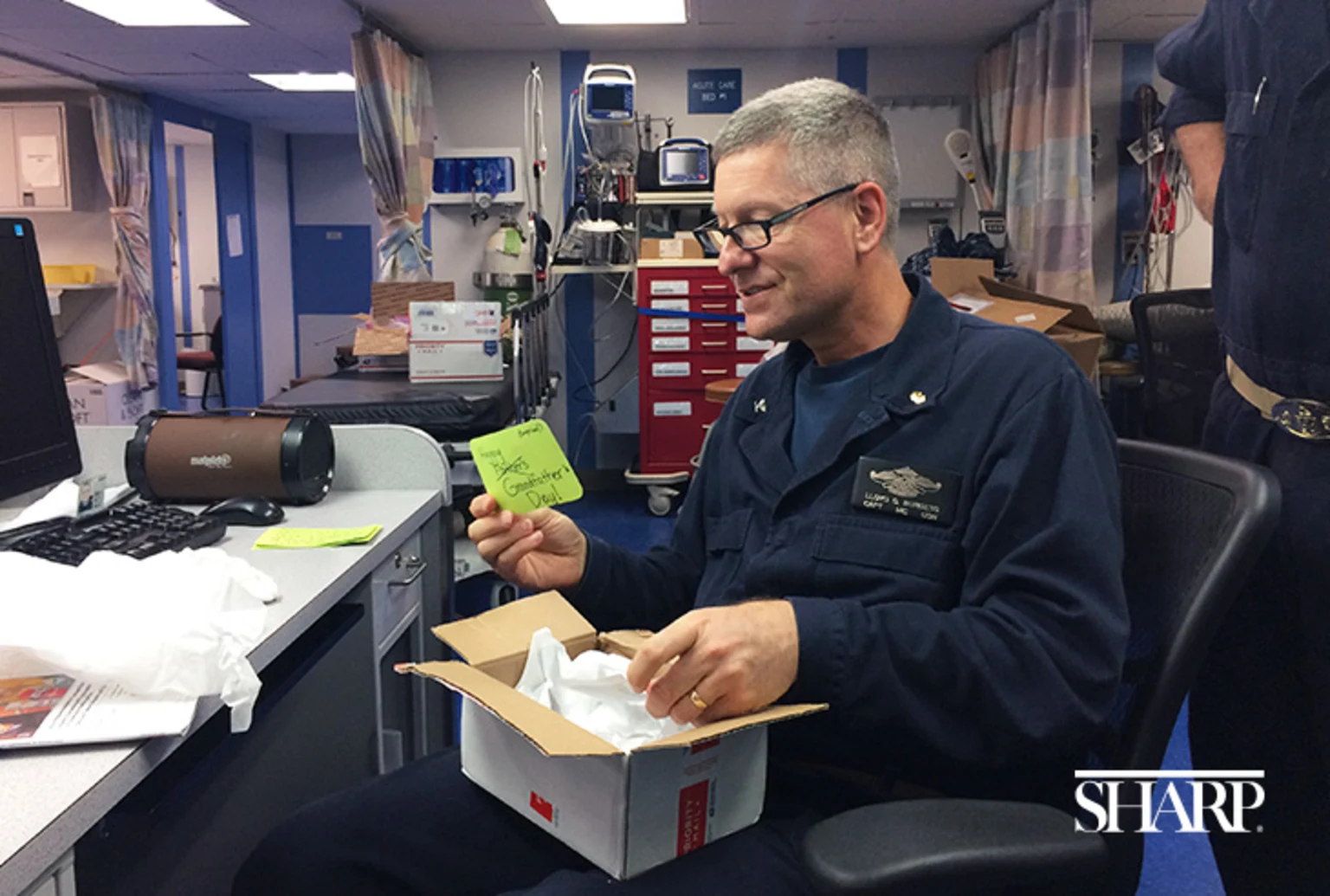
6 tips for getting health insurance for the first time
Turning 26? Here’s what to know about getting your own health insurance plan.
Dr. Lloyd Burgess, a family medicine doctor affiliated with SharpCare Medical Group, had a very big reason for his recent Navy retirement. Or, one could argue, a very small one.
His daughter, Rachel, gave birth to his first grandchild, a round-faced smiler named Benjamin. So, after 26 years of deployments and overtime, he changed his rank from captain to grandfather.
In the military world, Dr. Burgess' retirement is considered somewhat early. He did, after all, call it quits just shy of a 30-year landmark, so his timing is a question he is asked often.
"It was a matter of priorities," he says. "I am passionate about the Navy and my service to my country, but my grandson is bringing a new chapter to my life and the lives of my family. I want to be here for him and them."
Throughout his career, Dr. Burgess has learned a lot about prioritizing what's important. He knows all too well the pressures associated with a military life, and how it affected his patients, his Navy comrades and his own family. Retirement is his first step in finding balance.
The second step was opening his family medicine practice in San Diego. For him, the office — located near Sharp Memorial Hospital — accomplishes two things: It gets him home every night and allows him to continue to serve the military community he's proud to be a part of.

To honor the Navy, Dr. Burgess decorated the walls of his private practice with nautical scenes and hats from each of the ships he was stationed on.
"My practice is open to anyone, but I do find that military families, vets and active-duty are enlisting me as their doctor. It's an honor, knowing the circumstances in their lives."
A grandmother's wish
Dr. Burgess hails from Whittier, California, a historical Quaker town south of Los Angeles. His love for the military came from John Wayne movies, while his love for medicine was inspired by his mother, a medical assistant.
Yet it was his grandmother who truly kicked off his career ambitions. "At a family party, as a child, someone asked me what I wanted to be when I grew up," he says. "I told them I wanted to be a doctor, and they all laughed — all of them except my grandmother. She said, 'Lloyd, it would be very good to have a doctor in the family.' So, I did it."
He went to Chicago Medical School in 1986 and completed surgical and emergency medicine rotations at Mount Sinai Hospital and Cook County Hospital, respectively. Both hospitals saw their share of knife and gun injuries, and Cook County Hospital's fast pace and high-stakes trauma is said to have inspired the popular TV show, "ER."
During his schooling, Dr. Burgess met and married his wife, Jo Ellen. He was enamored by her wisdom and, like him, Jo Ellen was passionate about helping others.

Dr. Burgess with his wife, Jo Ellen. The pair have been married for over 29 years.
As the pair shipped out to Camp Pendleton, it didn't take long for Dr. Burgess to bridge the gap between medical and military. He led medical responsibilities for an infantry battalion, and years later set out on a long series of deployments.
Though they brought him to new and exciting places, these deployments also took him away from the family he and Jo Ellen were starting.
"I was the officer in charge of medical services on many ships, from the USS Boxer to the USS Makin Island. I saw the world, treated countless patients from wounded Marines to families facing illness. It was long hours with occasional tense moments. It was hard to be away from my family, but it was gratifying to be a part of something so big."
The "everyone" doctor
From Oceanside to Italy to Japan, on or off a ship, Dr. Burgess was considered a "womb to tomb" doctor. The expectation was that he could generally treat all people from prenatal care to end-stage geriatrics. He did colonoscopies, delivered babies, assisted with C-sections, and faced traumas and emergencies.

Dr. Burgess on board a CH-53E helicopter, supervising the medical evacuation of a sailor from the USS Essex to Okinawa, Japan.
When needed, he would call in a specialist, but Dr. Burgess compares his care to "Leave It to Beaver." "I had to be everywhere for everyone, like a small-town doctor. One day I'd deliver a baby, the next I'd provide geriatric care to his grandmother."
At a moment's notice, he could be reassigned or his fellow physicians could. Which would leave Dr. Burgess with more patients and less free time.
The pressures of military life have real-life health effects
What Dr. Burgess began to realize is that this high-pressure experience was not limited to doctors. The military is high-pressure and he could see it in the eyes of every ranking member.
The military, he describes, is like a ladder. There's an expectation to make a constant climb and in order to stay in the military, you need to advance in rank. Civilian life, on the other hand, is more like a jungle gym. You can climb if you want to or stay where you are.
While this constant ascent brought Dr. Burgess more leadership and administrative duties, it also meant less time for direct patient care. However, he always made it a priority to mentor and help active-duty sailors and Marines who were mentally stretched by similar pressures.
Dr. Burgess remembers one patient in particular — a senior chief who had climbed the ranks from the role of seaman. He was overworked, overtired and looking out for everyone but himself. The stress was taking a toll.
"He had Type 2 diabetes, hypertension and sleep apnea," say Dr. Burgess. "He was overweight and drank coffee all day. It was like he was a walking zombie." He was on the verge of retirement, and asked Dr. Burgess for help.
To start, Dr. Burgess secured him a CPAP machine. Addressing the chief's sleep apnea was the first step in bringing him back to health. He then provided education on managing diabetes and hypertension — from diet and exercise to the proper use of medications.
Years passed before Dr. Burgess saw the chief again. When he did, he barely recognized him. As a Navy-contracted educator, the chief flew onto a ship in the Pacific where Dr. Burgess was stationed. "He was a completely different person," he says. "He told me that I had changed his life, that he took my advice and recommendations seriously, and he finally learned how to take care of himself."
A difficult decision and a new life
Last year, Dr. Burgess' daughter shared her exciting pregnancy news, and it gave Dr. Burgess a lot to consider. His Navy life had given him a sense of fulfillment many only dream about. His travels had let him see the world. His Oceanside ZIP code allowed his wife and children to be rooted in the beauty of Southern California. And his love for medicine was realized in every patient.

While deployed aboard the USNS Mercy, Dr. Burgess received news that his daughter, Rachel, was expecting his first grandchild.
Yet after two and a half decades of service, he started to think about what he was missing. The family dinners, the birthday parties, the holidays at home with family.
"I remember a time where I missed my son's first backpack trip with the Boy Scouts," he says. "Something went wrong with his backpack, and it was poking him in the back the whole time. It made him hate the trip, and he soon lost all interest in scouting. I kept thinking, 'If only I had been there.'"
So in July 2018, Dr. Burgess completed his last deployment. Today, he's slowly settling into civilian life — where the biggest medical trauma he sees is on TV, and Jo Ellen always knows when to expect him.
Does this quieter life make him miss his ships? Sometimes. But he continues to live his military life every day in the patients he sees.
"I know what they go through," he says. "I understand the kids who miss their mom or dad, the older vets who tell me stories. This is an incredibly dedicated community, and their needs are often unique and misunderstood. I've had a long, wonderful career that brought me to this practice. And for once I can say I'm not going anywhere."

Our weekly email brings you the latest health tips, recipes and stories.